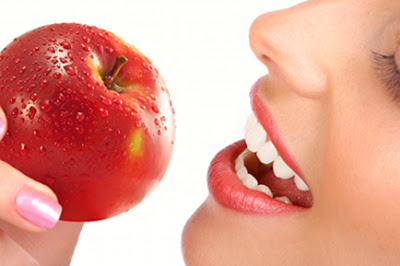Today, taking care of teeth is about more than going to the dentist every six months. In fact, what a person eats outside of those two visits is essential for oral and overall health.
According to the Academy of Nutrition and Dietetics, “. . . nutrition is an integral component of oral health” and “collaboration between dietetics practitioners and oral health care professionals is recommended for oral health promotion and disease prevention and intervention.”
Oral health problems that can occur with improper nutrition
While the Academy of Nutrition and Dietetics stresses that the most common chronic oral health condition is the development of cavities, they also note that tooth loss caused by periodontal disease is a serious concern.
Both tooth decay and periodontal disease can be caused by a variety of factors including poor at-home oral hygiene habits, infrequent dental visits, certain medications and smoking. Regarding diet, it’s no secret that consumption of sugary foods plays a role since they leave a sticky residue that can erode teeth.
Even stress, which can be kept at bay with the help of a balanced diet, can contribute to oral health problems. When stressed, a person often grinds and clenches teeth, which can produce wear over time.
Finally, jaw development can change based on diet. One study by the University of Kent showed a correlation between types of foods consumed and the chewing habits required to ingest those foods. The findings showed that the lower jaw specifically grew too short with a “soft” diet, demonstrating an association between societal shifts regarding reliance on wild plants and foods compared to today’s reliance on domesticated choices. Today’s modern foods typically consist of more traditional, softer junk food diets: think of ground up burgers and soft donuts and the finding makes sense.
Best foods and vitamins to keep oral and overall health in shape
The Academy of Nutrition and Dietetics recommends “Eating a healthy balanced diet of fruits, vegetables, lean protein and low-fat dairy products and whole grains that provide essential nutrients for optimum oral health and overall health.”
Some fruits and vegetables include oranges and strawberries since their vitamin C helps fight gum inflammation. Raisins and cranberries have polyphenols that have been shown to keep plaque from sticking to teeth.
Non-soft foods such as celery and carrots are also important. Christine D. Wu, pediatric dental researcher from the University of Illinois, says that “Things like carrots and apples aren’t only loaded with antioxidants, they can help mechanically clean your teeth” by breaking up plaque.
Also, when pregnant, know that a baby’s teeth start to develop as soon as the fifth week of pregnancy. Its suggested that a pregnant mother consume vitamins A, C, D, protein, calcium and phosphorous.
Source: natural news


